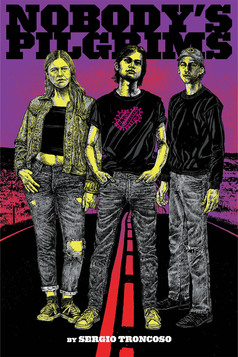Review: Troncoso, Sergio. Nobody's Pilgrims. NY:Cinco Puntos Press, 2022.
Michael Sedano
It’s a great time to be a novel reader in the United States right now, with this cultural shift happening all over the place, from politics to literature. A few years ago, big New York publishers exulted over the money they spent to bring “American Dirt” to the market, only to have raza critics start an avalanche of outrage that such an inappropriate novel got such big play.
Publishers aren’t doing Dirt any more. Instead, last month Atria brought out Reyna Grande’s sweeping romance Ballad of Love and Glory. This month, Cinco Puntos Press, under its new stewardship by Lee&Low, brings Sergio Troncoso’s Nobody’s Pilgrims (link).
 Troncoso, who’s built a stellar reputation out of immigrant stories, introduces immigrant characters then yanks them off the border and sends them on a headlong flight into middle America, then off to rural Connecticut. The author calls them “Pilgrims,” a useful handle for the three, then two, young adults who set off on a coming-of-age road trip in altruistic innocence, only to be the inadvertent plague-bringers who bring the nation to its knees. The kids are all right—they don’t know what they’ve done but we do.
Troncoso, who’s built a stellar reputation out of immigrant stories, introduces immigrant characters then yanks them off the border and sends them on a headlong flight into middle America, then off to rural Connecticut. The author calls them “Pilgrims,” a useful handle for the three, then two, young adults who set off on a coming-of-age road trip in altruistic innocence, only to be the inadvertent plague-bringers who bring the nation to its knees. The kids are all right—they don’t know what they’ve done but we do.
Maybe “pilgrims” is a feint by Sergio Troncoso to get people looking the other way, not notice two peculiar immigrants meet in a chicken factory and a few days later strike out across the country, the Mexicano looking for work, the Chicano looking for imagined landscapes. The boys pick up a cute blonde waitress in rural Missouri, to launch part 2 of a perilous journey only two will survive.
Sweet and innocent teenagers dreaming about utopian futures are a beautiful concept. Imagine a counterpart: the worst kind of narcos and set them hot on the heels of the kids. In fact, have a pair of vicious assassins, unknown to one another, track the kids. Adding to a reader’s pleasure, Troncoso lets the kids suspect the danger while letting the reader in on the gruesome details. Unlike the reader, the kids go through the story having no idea how close to the abyss they’re falling.
In fact, Troncoso pushes them over the edge and into a pandemic abyss. Nobody’s Pilgrims is a plague novel with a double dose of dramatic irony. The kids know it’s all their fault that the two murderers come after them. They keep that a secret. The kids have no idea their role in unleashing that plague. Troncoso keeps that a secret from them. The novel closes in a dystopic Eden, the two surviving roadtrippers doing Eve and Adam, hoping for a healthier world, as if they bore no responsibility for what they left in their wake.
Segments of the novel bear the distinct marks of observing United Statesians during plague-time these past few years. People wear masks, get vaccinated, get exposed, don’t get sick. People aren’t cautious, or behave thoughtlessly, they get sick and suffer and die. Whose fault is this? It doesn’t matter, Nobody’s Pilgrims tells us. It got loose, however it got out. Now if you have a lot of money and hoard what you’ll need, you can ride out the worst of it.
Don’t blame me. That’s how the story wraps up. Invite Troncoso to your next Living Room Floricanto and have a discussion about that ending. Has the author concocted a delightful allusion to a Connecticut Chicano holding off an assault by Ice 9?
Troncoso assembles a satisfying cast of characters. Turi, Molly, and Arnulfo are three ingenue protagonists wearing rose-colored glasses with smudged lenses. Don Ilan, Juanito, and El Hijo de Huerta, together with Dunbar, Eduardo and Chucho, give people nightmares if these bad guys get their claws into Molly or Turi.
While Molly and Turi are decent gente who deserve to be helped, Troncoso's characters define their hopes aided by immigrant characters whose noble mutualist values grow out of the immigrant experience. “We help each other, I remember how tough it was,” is their attitude.
For character development, Troncoso tosses a bit of complexity one's way. The two assassins, Eduardo and Chuco, share a few quiet moments, hasta sharing a poem aloud. For a few pages, Turi begins to see Juanito as just an old vato.
Nobody’s Pilgrims has so many good things going for it. It’s funny. It’s scary. It’s sweetly romantic. Don’t stop there, let it sink in that, la-dee-dah while these kids are falling in love, the world is being brought to its knees, not just owing to the virus, but because how people respond to it.
What are you going to do about that? Where are you going to go hide out, ride out a hard storm?

No comments:
Post a Comment